仁爱英语九年级第三单元词组归纳整理Unit_3_词组[1] (1)
仁爱英语九年级第三单元词组归纳整理Unit_3_词组[1]
![仁爱英语九年级第三单元词组归纳整理Unit_3_词组[1]](https://img.taocdn.com/s3/m/f88bd9bb3b3567ec112d8aad.png)
仁爱版九年级英语Unit 3 Topic 11. 满意,高兴be pleased with2. 最后,终于at last3. 成百万的millions of4. 迫不及待做某事can’t wait to do sth.5. 从现在开始from now on6. 为……做准备be ready for7. 被广泛地使用be widely used 8. 全世界all over the world around the world 9. 出差on business 10. 与……相似be similar to11. 与……一样the same as 12. 向……寻求帮助ask…for help13. 通常来说generally speaking/ in general 14. 做……有麻烦have trouble doing 15. 有时once in a while 16. 随身携带take along with17. 扮演重要的角色play an important part/role in…18. 越来越漂亮more and more beautiful 19. 在……中很受欢迎be popular with 20. 在……取得进步make progress in doing sth. 21. 在19世纪In 19 century22. 把……当做……regard…as…23. 被……当做be regarded…as…24. 把……译为……translate…into…25. 把……分成… divide…into…26. …的数量the number of 大量的a number of27. 总之……in short / in a word 28. 坚持(做)某事stick to (doing)sth. 29. 既…又…/ 除…之外…as well asUnit 3 Topic 21.代替instead of 2、处于领先地位take the leading position3. 讲英语的国家English-speaking country4. 相互理解understand each other5. 成功地做某事succeed in doing sth.6. 表达自己的意思make oneself understood7. 为某人送行see sb off8. 不完全not exactly9. 大体上讲,总的来说generally speaking 10. 搭车ask for a ride11. 动身去……leave for……12. 冷静下来calm down13. 与…不同be different form 14. 离……很近be close to15. 至于as for 16. 爱好做某事be fond of doing sth.17. 更糟糕的是Even worse 18. 发生come about /take place19. 被迫做某事be forced to do sth. 20. 接纳,领会take in21. 一直all the time 22. 一点点little by little23. 面对面face to face 24. 在某人……的路上on one’s way to25. 伸出,扑灭put out 26. 进入get in27. 搭载,捡起,让……乘车pick up 28. 填充fill in 填满fill out29. 外貌上,亲自in person 30. 发生come about31. 听从某人建议follow sb’s advice 32. 顺便说by the way33. 依靠某人depend on sb. 34. 担心某人worry about sb./be worried about sb. 35. 做……有困难have difficulty doing sth. 36. 总的来说generally speaking37. 检验,检测check on 38. 大部分时间most of the time39. 翘起人的大拇指raise sb’s thumb 40. 伸出某人的大拇指put out sb’s thumb Unit 3 Topic 31. 在……薄弱be weak in 擅长be good at / do well in2. 阅读能力reading ability3. 给某人一些有关……的建议give sb. some advice on……4. 犯错误make mistakes 错误地by mistake5. (深)呼吸take a (deep) breath 上气不接下气out of breath6. 试一试have a try7. 嘲笑laugh at8. 意识到come to realize9. 最后但同样重要的last but not least 10. 放弃give up 11. 为了in order to 12. 日记keep a diary 13. 做笔记take notes 14. 有时at times15. 想要做某事feel like doing sth. 16. 只要as long as17. 继续做某事keep on doing sth 18. 害怕be afraid of19. 信任某人believe in sb. 相信某人believe sb.20. 各胜古迹place of interest21. 和某人分享share sth. with sb.。
仁爱英语九年级上册Unit3Topic2知识点
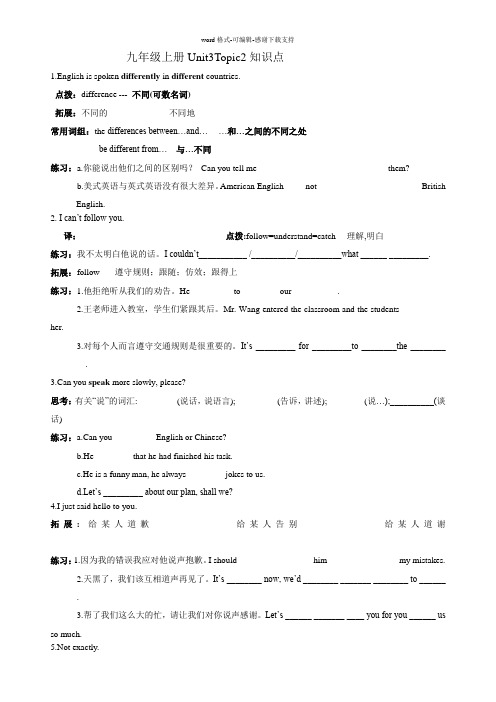
九年级上册Unit3Topic2知识点1.English is spoken differently in different countries.点拨:difference ---不同(可数名词)拓展:不同的_____________ 不同地______________常用词组:the differences between…and… ---…和…之间的不同之处be different from…---与…不同练习:a.你能说出他们之间的区别吗?Can you tell me _______ ____________ _________ them?b.美式英语与英式英语没有很大差异。
American English ____ not _______ __________ _____ BritishEnglish.2. I can’t follow you.译:_______________________________ 点拨:follow=understand=catch ---理解,明白练习:我不太明白他说的话。
I couldn’t___________ /__________/__________what ______ _________.拓展:follow --- 遵守规则;跟随;仿效;跟得上练习:1.他拒绝听从我们的劝告。
He _________ to ________ our __________.2.王老师进入教室,学生们紧跟其后。
Mr. Wang entered the classroom and the students __________ her.3.对每个人而言遵守交通规则是很重要的。
It’s _________ for _________to ________the ________ ________.3.Can you speak more slowly, please?思考:有关“说”的词汇:_________(说话,说语言); _________(告诉,讲述); ________(说…);__________(谈话)练习:a.Can you _________ English or Chinese?b.He ________ that he had finished his task.c.He is a funny man, he always ________ jokes to us.d.Let’s _________ about our plan, shall we?4.I just said hello to you.拓展: 给某人道歉__________________给某人告别__________________给某人道谢_____________________练习:1.因为我的错误我应对他说声抱歉。
新版仁爱英语九年级上册 Unit3 Topic1词汇练习及答案
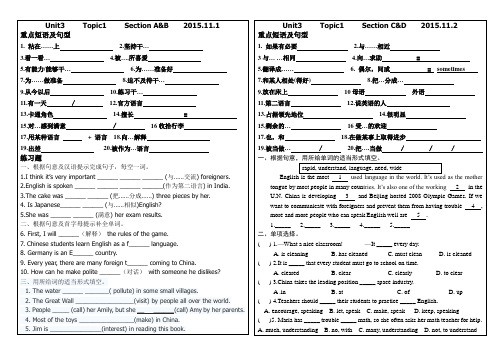
Unit3 Topic1 Section A&B 2015.11.1重点短语及句型1. 粘在……上2.坚持干…3.看一看…4.被….所喜爱5.有能力/能够干…6.为……准备好7.为……做准备8.迫不及待干…9.从今以后10.练习干…11.有一天 / 12.官方语言13.卡通角色14.擅长 = 15.对…感到满意 / 16收拾行李17.用某种语言+ 语言18.向…解释19.出差20.被作为…语言练习题一、根据句意及汉语提示完成句子,每空一词。
1.I think it’s very important ______ ______ ______ (与……交流) foreigners.2.English is spoken ______ ______ ______ ______(作为第二语言) in India.3.The cake was ______ ______ (把……分成……) three pieces by her.4. Is Japanese______ ______ (与……相似)English?5.She was ______ ______ (满意) her exam results.二、根据句意及首字母提示补全单词。
6. First, I will ______(解释)the rules of the game.7. Chinese students learn English as a f______ language.8. Germany is an E______ country.9. Every year, there are many foreign t______ coming to China.10. How can he make polite ______(对话)with someone he dislikes?三、用所给词的适当形式填空。
1. The water ______ _______( pollute) in some small villages.2. The Great Wall _________________(visit) by people all over the world.3. People _____ (call) her Amily, but she __ ______(call) Amy by her parents.4. Most of the toys ________________(make) in China.5. Jim is _______________(interest) in reading this book.Unit3 Topic1 Section C&D 2015.11.2重点短语及句型1. 如果有必要2.与……相近3与……相同 4.向…求助 =5.翻译成……6. 偶尔,间或 = sometimes7.和某人相处(得好)8.把…分成…9.放在床上10母语外语11.第二语言12.说英语的人13.占据领先地位14.很明显15.剩余的…16受…的欢迎17.也,和18.在做某事上取得进步19.被当做… / 20.把….当做 / / /一、根据句意,用所给单词的适当形式填空。
仁爱版九年级Unit3 Topic1词组

Unit3 Topic11 stick…on the wall 把。
粘在墙上2 can’t wait to do sth 迫不及待做某事3 have a good chance to do sth有一个好的机会做某事4 throughout the world 全世界5 from now on从今以后P56 6 be pleased with对。
感到满意P57 7 pack bags 打包8 on business 出差9 official language 官方语言10 be similar to。
与。
相似11 have trouble/difficulties doing sth在做某事方面有困难13 have long conversations 长对话交流P58 14 divide …into 把。
分成。
15 lay in the bed 躺在床上P59 16the number of …。
的数量a number of…许多。
17 mother tongue 母语18 second language第二语言foreign language外语base language基本语言P60 19 go abroad 出国20 play an important part in …在。
方面起重要作用P61 21 take the leading position in …在。
起领导作用22 make great progress in …在。
取得巨大进步P62 23 be required to do sth 被要求做。
24 be regarded as 被当成(视为)。
Unit3 Topic11 stick…on the wall 把。
粘在墙上2 can’t wait to do sth 迫不及待做某事3 have a good chance to do sth有一个好的机会做某事4 throughout the world 全世界5 from now on从今以后P56 6 be pleased with对。
仁爱英语九年级Unit3Topic1

Unit 3 Topic 1Section A能力目标:1.学习并掌握一般现在时的被动语态。
2.了解迪斯尼乐园的相关知识。
知识目标:Words:cartoon character language throughout garagePhrases(在课文中找出下面短语并翻译):from now on __________________ be pleased with _____________________be able to ___________________ can’t wait to do sth_________________have a good chance to do sth___________ practice doing sth_____________be spoken as _________________ be widely used ___________________ throughout the world___________ one day__________ be ready for______________ Key points:1. Disneyland is enjoyed by millions of people from all over the world.译:______________________________________________________。
→被动语态:主语是动作的承受着。
被动语态的条件:谓语必须是及物动词或词组。
被动语态的构成:be+过去分词。
2. I can’t wait to fly there! 译:____________________________.can’t wait to do sth. 迫不及待地做某事eg. Liu Xiang is a super man. We can’t wait to see him.3. You’ll have a good chance to practice English there. 译:____________________4. Try your best and work much harder from now on. 译:____________________课堂练习:I . 选择题( ) 1. —What a nice classroom!—It every day.A. cleansB. has cleanedC. is cleanedD. must clean ( ) 2.The Chinese Great Wall is known in the world.A. wideB. widelyC. hardD. hardly ( ) 3. Someone has a label(标签) the bottle.A. stick; onB. sticked; onC. stuck; onD. stick; to ( ) 4.English is _____spoken in the world now.A. wideB. quietlyC. widelyD. quite()5.The Olympic Games ________ every four years.A. are heldB. were heldC. are holdingD. will holdII.将下面的句子变成被动语态。
九年级英语上册Unit3知识点归纳

九年级英语上册Unit3知识点归纳九年级英语上册Unit3知识点归纳 1.取钱 get some money 2.买一些杂志/邮票 get/buy some magazines 3.获取一些有关小镇的信息get some information about the town 4.买一双鞋 get/buy a pair of shoes 5.买一份报纸 buy a newspaper 6.买一本字典 buy a dictionary 7.买一些有票 buy some stamps 8.吃饭 have dinner 9.怎样到达… how t o get to sp 10.沿着 go along/ go down 11.在银行的旁边 beside the bank 12.在右边 on the right/left 13.在某人的右边on one’ s right 14.去三楼 go to the third floor 15.向左转 turn left/ right 16.在…之间between …and… 17.走过书店 go past the bookstore 18.做…激动 be excited to do sth.19.从/以…开始 start/ begin with 20.不必匆忙 not need to rush 21.有……独特之处be special about.. . 22.加油 , 过来 come on 23.休息室 a room for resting 24.请再说一次 pardon me 25.抓住某人的手hold one’ s hand 26.摇滚乐队 a rock band 27.起初 at first 28.在去.......的路上on one’ s way to... 29.经过、路过 pass by 30.开始玩 start playing 31.沿 ... 走;走上;走近walk up 32.在门边 at the door 33.在门旁 by the door: 34.在那个时刻 at that time 35.来得更早点 come a little earlier 36.占位子 get a table 37.一些吃的东西 something to eat 38.最近的银行 the nearest bank 39.寄信 mail a letter 40.在购物中心 in the shopping center 41.寻求帮助 ask for help 42.怎样有礼貌的寻求帮how to ask for help politely 43.学会怎样才是礼貌的 learn how to be polite 44.在不同的情况 in different situations 45.使用恰当的语言 use the suitable/right/proper language 46.立足于以…为根据 base on 47.取决于/依靠 depend on 48.引入一个请求 lead in to a request 49.停车park one’ s car 50.一个地下停车库an underground parking lot 51.换钱change money 52.去.......的路 the way to... 53.在一个说英语的的国家 in an English-speaking country 54.进行一个短期的假期学习 go on a short study vacation 55.为……感谢某人thank sb. for doing sth.56.期待 look forward to+n./doing 57.醒来 wake up 58.仓促地做某事 in a rush to do sth 59.做某事很方便 be convenient to do 60.第一次见到某人meet sb. for the first time 61.更擅长 become better at… 62.使…想起remind …of… 63.一个吃饭的好地方a good place to eat二、重点句型1. not…until… You never know until you try something. 凡事只有亲身经历了才能了解。
九年级英语上册unit3重点词组归纳(仁爱版)

九年级英语上册unit3重点词组归纳(仁爱版)1gtthepitures去看电影;gtthevies去看电影2…listtheuntriesthatuseEnglishasanffiiallanguage列举把英语用作官方语言的国家3theradt…通向……之路4attheendf在……末端,在……尽头,btheend最后beausef因为……anbeautifulfisharefastdisappearingbeauseftheseverep llutin因为污染严重,许多美丽的鱼类正在面临绝种。
Anarguentasinevitablebeausethedisliedeahthersuh 争论是不可避免的,因为他们彼此非常厌恶。
6nativeEnglishspeaers以英语作为母语的人7evenif即使,用来引导一个让步状语从句,后面既可用陈述语气,也可用虚拟语气,但是evenif/eventhugh,引导的从句中不用将来时。
如:Eventhugh/ifitrainstrr,eillleavefrBeiing8eup走上前来,走近,发生,出现eupith追上,赶上,提出9Atuallalllanguageshangeanddevelphenultureseetandun iateitheahther事实上,当不同文化相互交流渗透时,所有的语言都会有所发展、有所变化。
0bedifferentfr…与……不同bedifferentin…在……不同stfpretsillbeildldifferentinperfranefrnenighttthene xt我多数作品每天晚上的演奏风格都各不相同。
Asen,BritainEnglishisalittledifferentfrAerianEnglis h中所周知,英国英语和美国英语有点不同。
仁爱版九年级英语上册Unit3--4 重点词组默写版及答案

仁爱版九年级英语上册Unit3 重点词组默写版Unit 3 Topic 1一、重点短语1.贴在墙上2.迫不及待做某事3.有机会做某事4.能够做某事5.从现在起,开始6. 设法做某事7.和某人交流8.出差9.作为母语10. (毫不)费力做某事11.与-----相似12.向…求助13.处于领先地位14.在---方面取得进步15.结果16.受----欢迎17.把......分成......18. 取得进步19.被要求做某事20.被当作......二、短语运用,用所给短语的适当形式填空,使句子完整、通顺。
(每个短语限用一次;有两个短语是多余的)on business, make great progress, divide... into...more and more, be pleased with, be similar to, as a result1.The parents their children’s good behavior.2. His teaching style our English teacher's.st month he went to Europe and comes back home today.4.Thanks to your help, I’ve in my study.5.The weather was really bad , we couldn't go camping that day.仁爱版九年级英语上册Unit3 Topic2重点词组Unit 3 Topic 2一、重点短语1.祝你旅行愉快2. 与…不同3.去飞机场的路上4.送别,给某人送行5.怎么了?6. 搭车,搭乘7.让某人搭便车8.你好吗?9.写回信给某人10.更糟糕的是11.一小时后,一小时内12.有时;间或13.犯错误14. 代表15.注意,留心16.做调查,做研究17.从......借用18.把.......比作19.挥手20.作为......的象征二、短语运用,用所给短语的适当形式填空,使句子完整、通顺。
(完整版)仁爱英语九年级上册知识点归纳
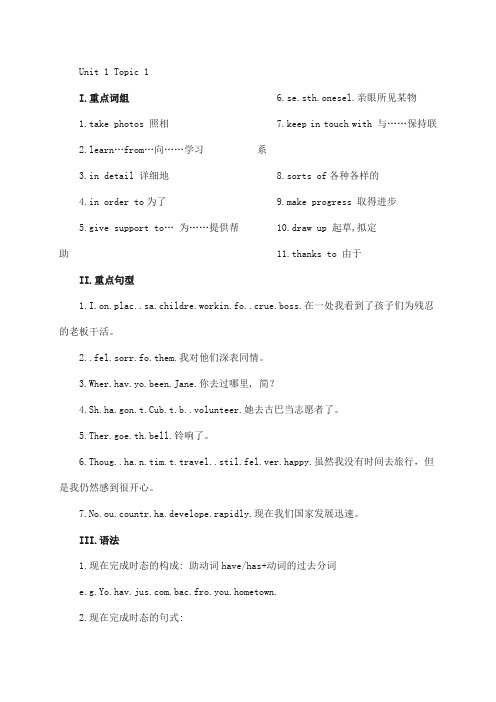
Unit 1 Topic 1I.重点词组1.take photos 照相2.learn…from…向……学习3.in detail 详细地4.in order to为了5.give support to…为……提供帮助6.se.sth.onesel.亲眼所见某物7.keep in touch with 与……保持联系8.sorts of各种各样的9.make progress 取得进步10.draw up 起草,拟定11.thanks to 由于II.重点句型1.I.on.plac..sa.childre.workin.fo..crue.boss.在一处我看到了孩子们为残忍的老板干活。
2..fel.sorr.fo.them.我对他们深表同情。
3.Wher.hav.yo.been.Jane.你去过哪里, 简?4.Sh.ha.gon.t.Cub.t.b..volunteer.她去古巴当志愿者了。
5.Ther.goe.th.bell.铃响了。
6.Thoug..ha.n.tim.t.travel..stil.fel.ver.happy.虽然我没有时间去旅行,但是我仍然感到很开心。
7.No.ou.countr.ha.develope.rapidly.现在我们国家发展迅速。
III.语法1.现在完成时态的构成: 助动词have/has+动词的过去分词.bac.fro.you.hometown.2.现在完成时态的句式:e.g.(1..hav.bee.t.Moun.Huan.wit.m.parents.(2) I haven’t seen him for a long time.(3) Where have you been?(4.——Hav.yo.eve.cleane..room?.——Yes..have..No..haven’t.3.have.ha.been.have/ha.gon.的区别have/has been to sp.表示曾经到过某地—— have/has gone to sp.表示已经去了某地e.g.(1..hav.bee.t.Moun.Huan.wit.m.parents. .(2.Sh.ha.gon.t.Cub.t.b..vo lunteer.Unit 1 Topic 2I.重点词组1. get lost 迷路2. each other 彼此3.at least 至少4take place发生5because of 因为6.b.stric.wit.sb.对某人严格要求.7.carry out 实行8.be short of 缺乏9.take measures to do sth.采取措施做某事10.be known as…作为……而著名11.work well in doing…在……方面起作用12.a couple of 一些13keep up with赶上,跟上II.重点句型1.Hav.yo.foun.hi.yet.你已经找到他了吗?2.——.reall.hat.t.g.shopping.我的确讨厌购物。
九年级英语第三单元知识点归纳单词[1]
![九年级英语第三单元知识点归纳单词[1]](https://img.taocdn.com/s3/m/eec9117f814d2b160b4e767f5acfa1c7ab008253.png)
九年级英语第三单元知识点归纳单词[1]九年级英语第三单元知识点归纳单词(一)名词1 执照license =licence 在美语中license是动词或名词。
在英语中license是动词;licence是名词。
drive license 驾照license作动词时是“获得驾照”。
2 耳环earring3 学习study study 侧重指主观上努力学习的动作,即“用功”“求学”。
learn 侧重指学习结果,即“学会” learn from “向…学习”。
study under “在…指导下学习”。
4 现在present 作名词时也是“礼物”。
作动词时是“赠予”。
作形容词时是“在场的”。
5 机会opportunity chance “机会”强调其偶然性。
opportunity “机会,机遇”带有适逢其机会,正好便于行事之意。
6 自愿者volunteer 作动词时是“自愿”。
volunteer to do sth. 自愿做某事volunteer sb. for sth. 让他做某事7 会员member 形容词形式memberless “无会员的”。
life member 终身会员member of a staff 一群人中的一员8 混乱mess 作动词时是“弄脏”。
be in a mess 杂乱无章某物mess sth.(up) 弄脏make a mess of 把…弄脏9 简报newsletter10 重要importance 形容词形式是important“重大的” Put importance on sth. 认为某事很重要11 要点point point作动词时是“指向”at\on the point of 将近off the point 偏离要点to the point 切中要点(二)动词1 刺穿pierce get ear pierced 打耳洞2 集中concentrate 形容词形式是concentrated“集中的”。
人教版九年级上册英语Unit3词组句子归纳总结-最新

人教版九年级上册英语Unit3词组句子归纳总结1.取些钱get some money2.得到一些关于…的信息get some information about3.哪里买些杂志where to get some magazines4.一双鞋a pair of shoes (三单)5.告诉我如何到书店tell me how to get to the bookstore //arrive at //reach6.沿主街走go along Main Street7.经过中央大街pass Center Street8.在你的右侧(be) on your right/在右侧on the right9.在银行附近beside the bank10.去三楼go to the third floor /住三楼live on the third floor11.右拐turn right /左拐turn left/在第二个十字路口左转(2)turn left at the second crossing//take the second turning on the left12.经过那家书店go past the bookstore //pass by13.最大的游乐园the biggest amusement park14.对做某事感到兴奋(2)be excited to do …//about doing15.尝试那些乘骑项目try the rides16.以...开始start with…17.中国人people in China18.说英语speak English/用英语说它say it in English19.在那边over there20.很快be quick21.需要着急need to rush/急匆匆做某事rush to do sth. / do sth. in a rush22.继续那个新的乘骑项目go on the new ride23.在太空世界(be) in Space World24.那边那个新的乘骑项目that new ride over there25.看起来害怕look scary26.快点;加油come on27.令人兴奋be exciting28.害怕be scared 29.握住我的手hold my hand (held, held)30.起初; 开始时at first31.饿了be/get hungry32.快点买到一些好吃的食物get some good foodquickly33.提议某物suggest sth./建议做某事suggest doing…/建议+从句suggest that sb. (should) do…34.提供美食serve delicious food35.在某人去...的路上on one’s way to…/on my way to the library/on their way to school/on her way home36.经过鲍勃叔叔的饭店pass by Uncle Bob’s //go past37.看起来有趣look interesting38.稍后回这来吃饭come back here for dinner later39.朝…走去walk up to…40.一位工作人员a staff person41.在门口at the door42.(够)忙be busy enough/忙于某事be busy with sth./忙于做某事be busy doing sth.43.在那时at that time44.早点来come a little earlier45.占个桌get a table46.沿着这条街down the street47.中央图书馆the Central Library48.附近的那家意大利餐馆the Ital ian restaurant nearby49.到附近的一家餐馆get to a nearby restaurant50.抱歉;对不起;请再说一遍Pardon me51.需要邮封信need to mail a letter/它需要打扫. It needs cleaning52.这附近;这周围around here53.在购物中心in the shopping center54.最近的银行the nearest bank55.沿这条街向东走go east along this street九Unit3 A句子1.打扰了,你知道我在哪能买到一些药吗? Excuse me, do you know where I can get some medicine?2.当然知道.然这条街有一家超市.Sure. There’s a supermarket down the street.3.请你告诉我如何到邮局好吗? Could you please tell me how to get to the post office?4.对不起, 我不确定如何到那. Sorry, I’m not sure how to get there.5.直到尝试了你才知道. You never know until you try something.6.我想知道接下来我们应该去哪里. I wonder where we should go next?7.起初我害怕,但是大喊确实很有帮助. I was scared at first, but shout ing did help.8.对不起,你知道这附近是否有餐厅吗? Pardon me, do you know if there’s a restaurant around here?9.打扰一下,请你告诉我最近的银行在哪里好吗?Excuses me, could you please tell me where the nearest bank is?10.你知道书店今天何时关门吗?Do you know when the bookstore closes today?11.它今天七点关门.It closes at 7:00 p.m. today.12.我们应该先玩什么? What should we start with?13.但是我们甚至还没有开始呢. But we haven’t even started yet.14.噢,不是.我不是那个意思. Oh, no, I don’t mean that.15.好的.我会快点的! OK. I’ll be quick!16.没问题.你不必着急! No problem. You don’t need to rush!17.噢,它看起来很吓人. Well, it looks scary.18.来吧!我保证它将很有趣. Come on! I promise it’ll be exciting.19.如果你害怕,就大喊或抓住我的手. If you’re scared, just shout or hold my hand.20.牌子上写着每晚摇滚乐队在这里演奏. The sign says a rock band plays here every evening.Unit3 B 词组1.去…的拐角处go to the corner of …/在角落at/on the corner(街角,室外/桌角);in the corner(室内)2.问关于… ask about…3.那位年纪小些的女孩the younger girl4.那位年长些的女孩the older girl5.一个吃饭的好地方a good place to eat6.哪种食物what kind of food7.参观外国visit a foreig n country8.知道如何礼貌地求助know how to ask for help polite ly9.有关问路的类似的请求similar request s for direction s10.正确be correct/改正一些错误correct some mistakes11.听起来不那么礼貌sound less polite12.一个很直接的问题a very direct question13.正确地问个问题ask a question correctly14.改变他们说话的方式change the way they speak15.在不同的情况下in different situations16.他们使用的表达方式the expressions they use17.彼此了解know each other18.可以all right19.很了解他们know them well20.可能听起来不礼貌might sound impolite21.听起来礼貌得多sound much more polite22.你的邮件地址your e-mail address23.花时间做某事spend time (in) doing sth. 24.引出一个请求lead ing into a request25.麻烦你trouble you26.求助之前before ask ing for help27.有礼貌地说speak politely/直接地说speak directly28.使用正确的语言use the right language29.更好地和别人沟通communicate better with other people30.哪里停我的车where to park my car31.一个地下停车场an underground parking lot32.递盐(给某人) pass some salt (to sb.)33.换一些钱change some money34.准备好be ready (for sth. / to do sth.)35.去村学校的路the way to the village school36.你要学的课程the course you will study37.去…旅行travel to…38.介绍你自己(给…) introduce yourself (to… )39.因做某事而感谢某人thank sb. for do ing sth.40.期待你的回复/做…look forward to your reply/doing…41.在…的拐角on the corner of…/at42.匆匆忙忙be in a rush43.按时到校get to school on time44.更好地计划你的时间plan your time better45.哪个地方which place46.一个好选择 a good choice47.第一次遇见某人meet someone for the first time48.在三楼on the third floorUnit3 B句子1.-你能告诉我哪里有吃饭的好地方吗? -当然.-Can you tell me where there’s a good place to eat? –Of course.2.当你到外国参观时,有礼貌的寻求帮助很重要.When you visit a foreign country, it’s important to know how to ask for help politely.3.仅仅正确地问问题是不够的. It is not enough to just ask a question correctly.4.当我们求助时我们还需要学习如何显得有礼貌.We also need to learn how to be polite when we ask for help.5.英语讲得好的人在不同情况下改变他们说话的方式.Good speakers change the way they speak in different situations.6.他们使用的表达方式可能取决于他们在和谁说话或者他们彼此有多了解.The expressions they use might depend on whom they are speaking to or how well they know each other.7.向你同班同学问直接的问题是可以的因为你很了解他们.It is all right to ask direct questions to your classmates because you know them well.8.它们包括例如”请你…好吗?”或者”我能问一下…?”这样的表达方式.They include expressions such as “Could you please…?” or “May I ask…?”9.彼得,请你告诉我你的邮件地址好吗?Peter, could you please tell me your e-mail address?10.打扰了,我想知道你是否能帮助我. Excuse me, I wonder if you can help me.11.很抱歉打扰你,但是…I’m sorry to trouble you, but…12.有礼貌地讲比直接讲也许似乎更难.It might seem more difficult to speak politely thandirectly.13.然而,学习在不同的情境下如何使用正确的语言很重要.However, it is important to learn how to use the right language in different situations.14.抱歉,你能告诉我在哪里停我的车吗?Pardon me, c ould you please tell me where to park my car?15.当然可以.那边有个地下停车场. Sure. There’s an underground parking lot over there.16.打扰了,你知道它几点开始吗? Excuse me, do you know what time it begins, please?17.到那很方便. It’s convenient to get there.。
仁爱版英语九年级上册单元知识点汇总第三单元
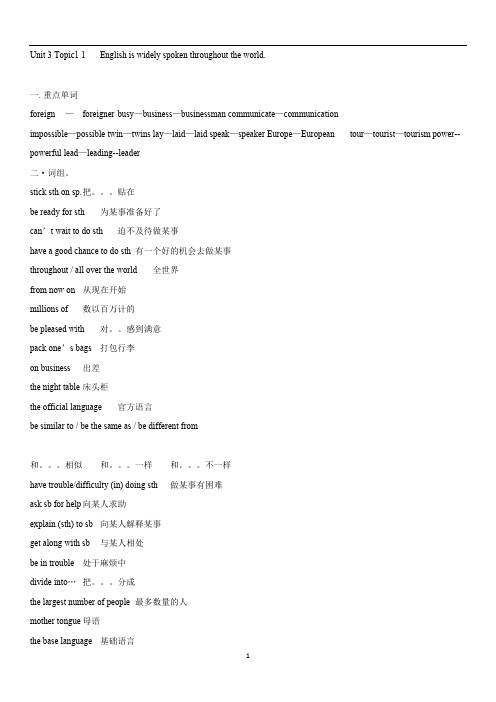
Unit 3 Topic1 1 English is widely spoken throughout the world.一. 重点单词foreign —foreigner busy—business—businessman communicate—communicationimpossible—possible twin—twins lay—laid—laid speak—speaker Europe—European tour—tourist—tourism power--powerful lead—leading--leader二·词组。
stick sth on sp. 把。
贴在be ready for sth 为某事准备好了can’t wait to do sth 迫不及待做某事have a good chance to do sth 有一个好的机会去做某事throughout / all over the world 全世界from now on 从现在开始millions of 数以百万计的be pleased with 对。
感到满意pack one’s bags 打包行李on business 出差the night table 床头柜the official language 官方语言be similar to / be the same as / be different from和。
相似和。
一样和。
不一样have trouble/difficulty (in) doing sth 做某事有困难ask sb for help 向某人求助explain (sth) to sb 向某人解释某事get along with sb 与某人相处be in trouble 处于麻烦中divide into…把。
分成the largest number of people 最多数量的人mother tongue 母语the base language 基础语言international business 国际商业the world’s airlines 国际航空in many different fields of life 在生活的很多不同领域go abroad 出国play an important part in our lives 在我们生活中扮演重要角色a powerful country 一个强大的国家take the leading position in 在某方面处于领先地位encourage sb to do sth 鼓励某人做某事be popular with sb. 受某人的欢迎make great progress in doing sth 在某事上取得巨大的进步require sb to do sth 要求某人做某事in the rest of 在。
2016九年级英语重点词组与句型(Unit 3-4仁爱版)
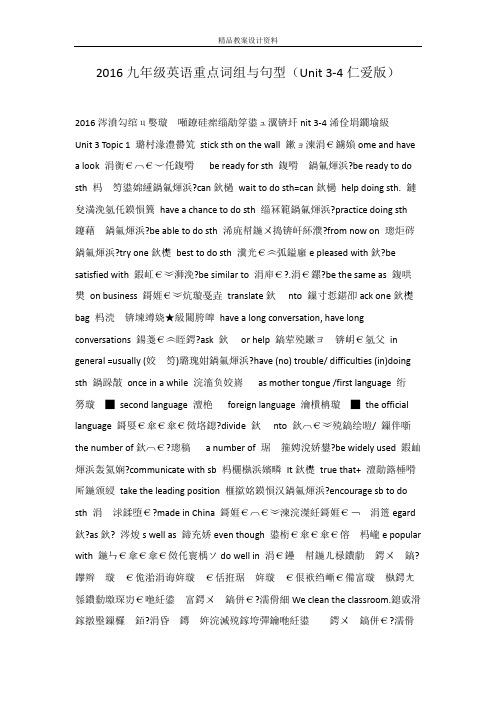
2016九年级英语重点词组与句型(Unit 3-4仁爱版)2016涔濆勾绾цnit 3-4浠佺埍鐗堬級Unit 3 Topic 1 璐村湪澧欎笂stick sth on the wall 鏉ョ湅涓€鐪媍ome and have a look be ready for sth ?be ready to do sth ?can鈥檛wait to do sth=can鈥檛help doing sth. 鏈夋満浼氬仛鏌愪簨have a chance to do sth 缁冧範鍋氭煇浜?practice doing sth ?be able to do sth 浠庣幇鍦ㄨ捣锛屽紑濮?from now on 璁炬硶鍋氭煇浜?try one鈥檚best to do sth 瀵光€︽弧鎰廱e pleased with鈥?be satisfied with 鍜屸€︾浉浼?be similar to 涓庘€?.涓€鏍?be the same as 鍑哄樊on business 鎶娾€︾炕璇戞垚translate nto 鏁寸悊鍖卲ack one鈥檚bag have a long conversation, have long conversations 鍚戔€︽眰鍔?ask or help in general =usually ()璐瑰姏鍋氭煇浜?have (no) trouble/ difficulties (in)doing sth 鍋跺皵once in a while as mother tongue /first languagesecond language foreign language the official language 鎶娿€傘€傘€傚垎鎴?divide nto 鈥︹€︾殑鎬绘暟/ 鏁伴噺the number of鈥︹€? a number of ?be widely used 鍜屾煇浜轰氦娴?communicate with sb 杩欐槸浜嬪疄It鈥檚true that+ 澶勪簬棰嗗厛鍦颁綅take the leading position 榧撳姳鏌愪汉鍋氭煇浜?encourage sb to do sth ?made in China egard 鈥?as鈥? 涔焌s well as 鍗充娇even though e popular with 鍦ㄣ€傘€傘€傚仛寰楀ソdo well in ??濡傦細We clean the classroom.鎴戜滑??濡傦細The classroom is cleaned (by us).?1锛?be+鍙婄墿鍔ㄨ瘝鐨勮繃鍘诲垎璇?锛坆y+瀹?鍏朵腑by鎵ц?濡傦細The glass is broken by that boy.鎵撶牬鐨勩€?be鏈変汉绉般€佹暟鍜屾椂鎬佺殑鍙樺寲锛屽叾鑲be浣滀负杩炵郴鍔ㄨ瘝鏃跺畬鍏ㄤ竴鏍枫€?濡傦細English is widely spoken around the world. 锛堣偗瀹氬紡锛?English is not widely spoken around the world. 锛堝惁瀹氬紡锛?Is English widely spoken around the world? ?Yes, it is./No, it isn鈥檛. 2锛?琚?锛?锛夊湪娌℃湁鎸囨槑鍔ㄤ綔鐨勬墽琛岃€呮垨鑰呬笉鐭ラ亾鍔ㄤ綔鎵ц歍his coat is made of cotton.杩欎欢澶ц2欻er bike is stolen.?3锛??++?鍏跺畠锛?+be+鍙婄墿鍔ㄨ瘝鐨勮繃鍘诲垎璇?by+瀹捐?鍏跺畠锛?娉ㄦ剰锛氾紙12y鐨?(1) People grow rice in the south. Rice is grown (by people) in the south. (2) She takes care of the baby. The baby is taken care of (by her). 硾浣跨敤1.---You 鈥檒l have a good chance to practice speaking English there. ---You鈥檙e right. 2.---But I鈥檓not good at English. I鈥檓a little afraid. ---Don鈥檛worry. 3.---Is Spanish similar to English? ---Not really. Unit 3 Topic 2 鎴戝惉涓嶆噦浣犵殑璇滻can鈥檛follow you. 鍋氬緱濂?Good on ya, mate =Well done?I鈥檓flying to Disneyland tomorrow.Have a good trip! 鐜╁緱寮€蹇?Enjoy yourself! 涓€鐩达紝鎬绘槸all the time 鍙栧喅浜庯紝瑙嗏€︹€﹁€屽畾锛屼緷闈燿epend on (doing sth) 涓庘€︿笉鍚?be different from 涓庘€︾浉鍚?be the same as 鈥︹€﹀拰鈥︹€︿笉鍚屼箣澶?differences between nd鈥?鎴愬姛鍋氭煇浜?succeed in doing sth. 浣垮埆浜虹悊瑙d綘make sb. understood (浣垮姩鐢ㄦ硶make sb. done )哄満鐨勮矾涓?on the way to the airport 閫佸埆see sb off 浼稿嚭put out 鎬庝箞浜嗭紵What鈥檚up? 鎯虫惌杞?ask for a ride ick up 鎴戜笉鏄庣櫧I鈥檓puzzled. 紑鐜╃瑧I鈥檓just kidding. 鑷充簬鏌愪汉/鏌愮墿as for sb/sth?澶т綋涓?generally speaking =in general =generally 璧峰眳瀹?a sitting room =a living room ?fill in a form =fill out a form 涔樺湴閾?take the subway= take the underground written/oral English 涔﹂潰/浼楁墍鍛ㄧ煡as we know 鍙戠敓come about 锛堝己璋冨師鍥狅級=happen 锛堝己璋冨伓鐒舵€э級?be forced to do sth 鍦ㄥ紑濮嬫椂in the beginning 娓愭笎鍦?little by little 鎬讳箣in short 閲囩撼take in 浣犲ソ鍚楋紵How are you doing? 鍐欎俊缁欐煇浜?write to sb. 鍐欏洖淇$粰鏌愪汉write back to sb. 鏇寸碂绯曠殑鏄?even worse 鍚戞煇浜鸿嚧浠ユ渶缇?Best wishes to sb. 鐢ㄧ幇鍦ㄨ繘琛屾椂琛ㄧず灏嗘潵鐜板杩戞垨杈冭繎鐨勫皢鏉ワ紝鎵€鐢ㄧ殑鍔ㄨ瘝澶氭槸浣嶇Щ鍔ㄨ瘝銆?濡傦細come, go, arrive, leave, fly, start, begin, return, open, die 渚嬶細I鈥檓going.鎴戣hen are you starting?浣犱粈涔堟椂Don鈥檛worry. The train is arriving here soon.?琛ㄧず灏嗘潵鐨勭幇鍦ㄨ繘琛屾椂闄や簡鐢ㄤ簬浣嶇Щ鍔ㄨ瘝澶栵紝浜﹀彲鐢ㄤ簬鏌愪簺闈炰綅绉诲姩璇嶃€?濡傦細My uncle is meeting us tomorrow.鎴戝彅鍙旀槑?She is buying a new bike soon.濂逛笉涔呭皢涔颁竴杈嗘柊?嗚В 1.I can鈥檛follow you. Can you speak moreslowly, please? 2.Oh, it sounds interesting. 3.If you want to succeed in making yourself understood, you need to know some of these differences 4.---What鈥檚up? ---The foreigner is asking for a ride. 5.Generally speaking, American English is different from British English in pronunciation and spelling. Unit 3 Topic 3 浣垮埆浜虹悊瑙d綘make yourself understood ?寰堝按灏?get into trouble 鍜屾煇浜轰細璋?have conversations with sb 鍦ㄢ€︹€﹀姫鍔涳紝鑷村姏浜?work hard at鈥? 鍚屾剰鏌愪汉鐨勭湅娉?agree with sb.oral/spoken English ??鍦ㄥ叕鍏卞満鍚?in public feel sleepy 鎷呭績鏈熸湯鑰冭瘯be afraid of the final test 鏈夋椂at times = sometimes = once in a while 鍚戞煇浜烘眰鍔?ask sb for help = turn to sb for help ?feel like doing sth=want to do sth.=would like to do sth. 鏀惧純give up 鍐欐棩璁?keep a diary 璇峰啀璇翠竴閬?I beg your pardon. 缁欐煇浜轰竴浜涘叧浜庘€?.give sb some advice?advise sbto do sth 鍦ㄢ€︹€︽柟闈㈠緢宸?寮?be weak in be afraid of making mistakes 鐞嗚В璇炬枃澶ф剰get the main idea of the article娣卞懠鍚?take a deep breath 姝g‘鍙戦煶get the pronunciation right缁?do some listening practice 鍋氣€︹€︽渶浣虫椂闂?the best time to do sth.hold a class meeting hare sth. with sb. 璋㈣阿浣犵殑鍊惧惉Thank you for锛坹our锛塴istening. 鍋氭煇浜嬫劅鍒拌崳骞?It 鈥檚an honor to do sth. 灏藉彲鑳界粡甯?as often as possible 灏辫繖浜?That鈥檚all. 璁颁綇鍘诲仛鏌愪簨remember to do sth. 璁颁綇鍋氳繃鏌愪簨remember doing sth. 鍧氭寔鍋氭煇浜?stick to doing sth / keep on doing sth. 璧峰垵at first 鍢茬瑧鏌愪汉laugh at sb. 閫狅紙瀹屾暣鐨勶級鍙ュ瓙make (complete) sentences 涓轰簡鍋氭煇浜?in order to do sth./so that +鍙ュ瓙閫愭笎鎰忚瘑鍒癱ome to realize 鏈€鍚庯紝浣嗗悓鏍烽噸瑕佺殑Last but not leastwh- +to do wh-when, where, which, who(m)鍙奾ow绛夎繛鎺ヨ瘝锛屽畠wh- +to do 缁撴瀯銆傝繖绉嶇粨鏋勫?h- +to do 杩欎釜涓嶅畾寮忓姩?濡傦細I don 鈥檛 know what to do.=I don 鈥檛 know what I should do. She can 鈥檛 decide which to buy.=she can 鈥檛 decide which she will buy.+涓嶅畾寮忊€濅簰鐩歌浆鎹?濡傦細I don 鈥檛 know what I should do.=I don 鈥檛 know what to do.want to know what Mary will do.(涓嶈兘璇?I want to know what to do.)犺嫳璇?1.---鈥? but I hate to speak English in public.---You 鈥檇 better not. 2.---I know it 鈥檚 very important to learn English well. But it 鈥檚 difficult for me.---Me, too. 3.Have you ever had any difficulties in studying English? 4.---鈥? could you give us some advice on how to learn English well? ---You 鈥檇 better follow the tape and do some listening practice. I think the best time to remember new words is in the morning. Unit 4 Topic 1 travle around 瀹炵幇姊︽兂 achieve one 鈥檚dream 鍙戝皠send up 韪忎笂set foot onmake progress in doing sth. 涓烘劅鍒拌嚜璞?be proud of (doing)sth 鍔濇煇浜哄仛鏌愪簨advise sb. to do sth. 鏈熸湜鏌愪汉鍋氭煇浜?expect sb. to do sth. 姣嬪焊璐ㄧ枒 there is no doubt that 鈥??in technology and business 鍑虹幇锛屼骇鐢?come into being ?with the help of 鈥? with one 鈥檚 help 澶氫簭锛岀敱浜?Thanks to 鈥? 鍋氱敓鎰廳o business 鐜╂父鎴?play games 鐪嬬數褰?watch moviesdo shopping 鍦ㄧ嚎鑱婂ぉ chat on line such as /for example /for instance 澶寸棝 get headaches 鐪肩潧鍙戠値 get sore eyes 姝g‘浣跨敤 use sth. properly 鍙戦€?send and receive an mail 鎸夌収涓嬮潰鐨勬寚绀哄仛follow these directions 鎵撳紑turn on 鎶娾€︹€﹀拰鈥?.杩炴帴connet o / with鈥?杩炰笂鑻辩壒缃慶onnect to the Internet 鐐瑰嚮click on 杈撳叆type in 鍦ㄥ睆骞曚笂on the screen a list of messages 鍋氬畬鏌愪簨finish doing sth ?鍚嶈瘝銆佸舰瀹硅瘝銆佸壇璇嶃€佷粙璇嶅拰鍔ㄨ瘝涓嶅畾寮忕瓑銆?锛堜竴锛?1.We call him Jim.锛堝悕璇嶏級?2.We must keep our school clean every day.锛堝舰瀹硅瘝锛?鎴戜滑蹇呴』姣忓ぉ淇濇寔鏍″洯娓呮磥銆?3.Call him in, please.锛堝壇璇嶏級璇峰彨浠栬繘鏉ャ€?4.Leave it on the desk.?锛堜簩锛夈€佸1.璺熷甫to鐨瘝鏈夛細ask, tell, get, teach, want, invite, like, allow, wish, encourage ell Jane to sing us a song.?2.ofeellisten to, hear锛?ake, let, have锛?鍥涚湅锛坙ook at, see, watch, notice et鈥檚have a rest.?浣嗚繖绉嶇o?He was seen to leave the room with a book in his hand.欎釜鎴块棿銆?3.璺熷甫to o?help?Can you help me (to) wash my clothes ???1.ee, watch, hear?I hear somebody singing in the next room. 鎴戝惉瑙佹湁浜哄?2.?You need to have your hair cut. 浣犻渶瑕佺悊鍙戜簡銆?Unit 4 Topic 2 When was it developed? be allowed to do sth 瀵光€︹€︽湁瀹?be bad for 鎶娾€︹€︾粰鏌愪汉鐪?show sth.to sb. 鐢扁€︹€﹀埗鎴恇e made of / from / in ?.be used for doing sth. 鐢扁€﹀紑鍙? 鍙戞槑/鐮斿埗be developed by / be invented by ?What 鈥檚the English for this ? What鈥檚this in English? 鍦ㄦ棩甯哥敓娲婚噷in one 鈥檚daily life 鍦ㄦ煇浜轰竴鐢熸湡闂?during one鈥檚life /?It 鈥檚said /reported that + 鍏嬮殕缇?the cloned sheep 鍒扮洰鍓嶄负姝?鑷充粖so far 浜虹被human beings: 鐢熺墿living things: 鍜屸€︾浉浼?be similar to 鍜屸€︿竴鏍穞he same as: know for certain 鎴愪负鎴戜滑鐢熸椿涓be part of our lives 瀵光€︽劅鍒版儕寮?be surprised at sth ?think for themselves 璀﹀憡鏌愪汉鏌愪簨warn sb of/about sth /that 涓嶅啀no longer=not ny longer 鎶娾€︹€︾湅鐫€/瑙嗕负treast鈥?as鈥?涓衡€﹀仛宸ㄥぇ璐$尞make a great contribution to (doing) sth n the medical field 瀵光€︽湁(涓嶈壇)褰卞搷have some( bad) effects on鈥?鍙戠幇find out 鍙戞尌寰堝ソ鐨勪綔鐢?work well in 鍙as long as鍦ㄥ叾浣欐椂闂撮噷during the rest of the time 杩疯矾lost one鈥檚way=get lost = be lost 鍦ㄦ.鏋椾腑杩疯矾lost one鈥檚way in a forest 閫冭窇run away 浣挎煇浜烘儕璁剁殑鏄?to one鈥檚surprise?be鐨勮繃鍘诲紡was/were+?When was it made? 瀹冩槸浠€涔堟椂鍊欏埗閫犵殑锛?It was made in 1980.瀹冩槸1980骞村埗閫犵殑銆?When was the digital camera invented? ?It was invented in 1975. 瀹冩槸1975骞村彂鏄庣殑銆?Unit 4 Topic 3 ?/浜哄叴濂婼ounds great!/ That sounds exciting. ?by spaceship 澶氫箞鏈夎叮What fun!塈鈥檓afraid not./ I鈥檓afraid so./ I hope so./ I hope not. 涓轰簡瀛︿範浜虹被鏂囧寲in order to learn about human鈥檚culture 浜茬溂鎵€瑙?see ith one鈥檚own eyes= see sth.oneself 绉戝scientific research 鍙傚姞鏈夊?take part in the space flight to Mars 鍙戠幇鏂颁笢瑗?discover something new ?prefer o 闀垮ぇgrow up ?master some basic skills 鍦ㄦ湭鏉?in the future base on 缁曞湴鐞僩o around the earth 鐩搁殧at a distance of on the surface 鐩稿綋浜庘€︾殑浜斿垎涔嬩簩鐨勫己搴?two-fifths as strong as 绂烩€﹁繎be close to 杩涘睍椤哄埄/涓嶉『go well / wrong land on Mars 鍦ㄦ梾閫旀湡闂?during the journey 鏇寸碂绯曠殑鏄?what鈥檚worse 姘翠緵缁檞ater supplies 闄愬埗鐢ㄦ按limit the use of water 鍊?00鍏冮挶be worth 100 yuan 鍊煎緱鍋氭煇浜媌e worth doing sth beyond the solar system 鎯呮€佸姩璇嶇??be+鍙婄墿鍔ㄨ瘝鐨勮繃鍘诲垎璇嶁€liens can not be seen on the earth. 鍦ㄥ湴鐞冧笂涓嶅彲鑳?Other planets may be visited soon in the future. 灏嗘潵鍏朵粬鐨勬槦鐞冧篃浼氭湁浜虹櫥闄嗐€?Scientific research should be done carefully.?These trees must be watered in time. 杩欎簺鏍戝簲璇ュ強鏃舵祰姘淬€?。
仁爱版九年级英语unit3知识点

仁爱版九年级英语unit3知识点Unit 3: Knowledge Points of Ren'ai 9th Grade EnglishIntroduction:In this article, we will explore the key knowledge points covered in Unit 3 of the Ren'ai 9th Grade English textbook. Understanding these concepts and applying them appropriately will help students enhance their language skills and overall comprehension.Vocabulary Development:One of the essential aspects of learning any language is expanding one's vocabulary. In Unit 3, students will encounter various new words and phrases related to different topics. It is important to remember and practice using these words in sentences to improve fluency. Some common words in Unit 3 include "volunteer," "responsibility," "donation," "charity," and "museum."Grammar Rules:Unit 3 also covers important grammar rules that can significantly impact one's ability to communicate effectively. One of the key focuses is on the past continuous tense. This tense is used to describe actions that were happening in the past at a specific time or while anotheraction was taking place. For example, "I was studying when my friend called me." Understanding and correctly using the past continuous tense can add depth and accuracy to one's spoken and written English.Listening Skills:Listening is a fundamental skill in language learning. In Unit 3, students will practice their listening skills through exercises and dialogues focused on different situations. These activities aim to improve comprehension and the ability to understand and respond appropriately. Students can work on their listening skills by regularly engaging in activities such as watching English movies, listening to podcasts, or conversing with native English speakers.Reading Comprehension:Reading comprehension is crucial for comprehending written texts accurately and extracting the meaning from them. In Unit 3, students will encounter various reading passages related to topics like volunteering, environmental protection, and cultural heritage. Understanding the main ideas, supporting details, and the author's purpose will enable students to answer questions effectively and demonstrate their comprehension of the text.Writing Skills:Unit 3 offers students opportunities to work on their writing skills through descriptive and narrative writing tasks. These writing exercises encourage students to express themselves and organize their thoughts in a coherent manner. Students can enhance their writing skills by practicing regularly, paying attention to grammar and vocabulary usage, and seeking feedback from teachers or peers.Speaking Practice:Speaking fluently and with confidence is a goal for many English learners. Unit 3 introduces various speaking activities that enhance students' ability to express themselves in different contexts. Group discussions, role-plays, and presentations allow students to practice their oral communication skills and develop their fluency and accuracy. Students should take advantage of these activities, actively participate, and seek constructive feedback to improve their speaking abilities.Cultural Awareness:In addition to language skills, Unit 3 promotes cultural awareness and understanding. Students are exposed to different cultural practices, traditions, and perspectives through texts and activities. This not only broadens their knowledge but also fosters empathy and respect for diverse cultures.Conclusion:Unit 3 of the Ren'ai 9th Grade English textbook encompasses various knowledge points that are important for language acquisition and skill development. By dedicating time and effort to vocabulary expansion, grammar understanding, listening and reading comprehension, writing practice, speaking fluency, and cultural awareness, students can excel in their English studies and become effective communicators in the global context.。
仁爱版九年级unit3知识点
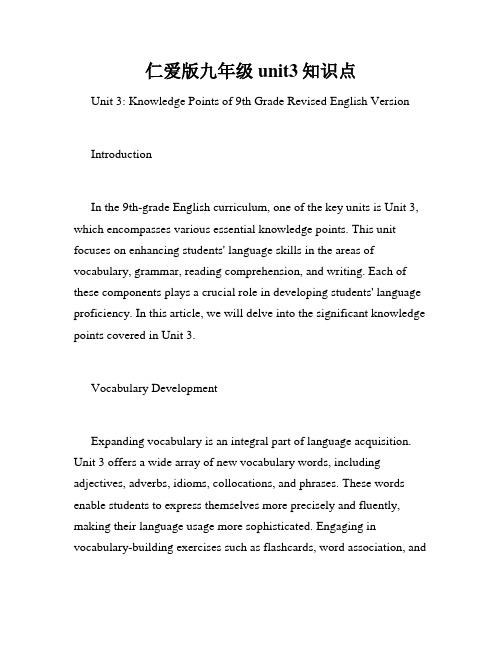
仁爱版九年级unit3知识点Unit 3: Knowledge Points of 9th Grade Revised English VersionIntroductionIn the 9th-grade English curriculum, one of the key units is Unit 3, which encompasses various essential knowledge points. This unit focuses on enhancing students' language skills in the areas of vocabulary, grammar, reading comprehension, and writing. Each of these components plays a crucial role in developing students' language proficiency. In this article, we will delve into the significant knowledge points covered in Unit 3.Vocabulary DevelopmentExpanding vocabulary is an integral part of language acquisition. Unit 3 offers a wide array of new vocabulary words, including adjectives, adverbs, idioms, collocations, and phrases. These words enable students to express themselves more precisely and fluently, making their language usage more sophisticated. Engaging in vocabulary-building exercises such as flashcards, word association, andcontextualized activities can greatly enhance students' knowledge and understanding of new vocabulary words.Grammar MasteryUnit 3 emphasizes the mastery of various grammar concepts that are vital to constructing accurate and coherent sentences. It includes exercises on verb tenses (present, past, future), reported speech, conditional sentences, passive voice, and direct-indirect questions. Understanding these grammatical structures allows students to effectively communicate their thoughts, ideas, and experiences. Regular practice and reinforcement, such as sentence construction and error correction exercises, can help solidify students' understanding and application of grammar rules.Reading ComprehensionEngaging with a variety of texts is crucial for improving reading comprehension skills. Unit 3 presents students with a collection of engaging and thought-provoking passages, including narratives, news articles, and informative texts. Through guided reading, reading strategies, and analysis of text structures, students can enhance their comprehension skills. Focusing on identifying main ideas, supportingdetails, and making inferences allows students to deepen their understanding of the texts, ultimately improving their overall reading proficiency.Writing SkillsUnit 3 aims to enhance students' writing skills by focusing on different genres and text types. It covers descriptive, narrative, and persuasive writing, allowing students to explore their creativity while following the conventions of various text forms. Students are encouraged to present their ideas coherently and persuasively, supported by relevant arguments and evidence. Regular writing assignments, peer review sessions, and teacher feedback are utilized to nurture students' writing abilities, promoting effective communication through written expression.Language Functions and PragmaticsUnit 3 also introduces language functions and pragmatics to further develop students' language proficiency. Language functions encompass skills such as giving opinions, expressing agreement or disagreement, making suggestions, and offering explanations. Understanding pragmatics enables students to use language appropriately in varioussocial contexts, taking into account factors such as politeness, formality, and cultural norms. Engaging in role-plays, discussions, and debates allows students to practice and apply these language functions in real-life situations.ConclusionUnit 3 of the 9th-grade English curriculum is a comprehensive module that focuses on various essential knowledge points. From vocabulary development and grammar mastery to reading comprehension and writing skills, this unit aims to foster students' language proficiency in a well-rounded manner. By strengthening these language skills, students are better equipped to express themselves fluently and effectively. Continuous practice and engagement with the materials covered in Unit 3 will undoubtedly contribute to students' overall language development and success in English studies.。
九年级仁爱英语Unit3知识点

九年级仁爱英语Unit3知识点Unit 3 Knowledge Points in Grade 9 Ren'ai EnglishIntroduction:In the ninth grade, students delve deeper into learning English, and one of the units they study is Unit 3. This unit focuses on various knowledge points that enhance their understanding of the English language. In this article, we will explore some of the key topics covered in this unit.1. Verb Forms and Tenses:One important aspect of Unit 3 is the study of verb forms and tenses. Students learn about the different verb forms and how they are used in different situations. They also learn about the various verb tenses, such as the present simple, present continuous, past simple, and future tenses. Understanding verb forms and tenses effectively allows students to express themselves more accurately in English.2. Passive Voice:Another essential topic in Unit 3 is the passive voice. Students learn how to construct sentences in the passive voice and understand when to use this form of expression. The passive voice is widely used inEnglish, and mastering it enables students to communicate effectively and confidently.3. Reported Speech:Unit 3 also introduces students to reported speech. They learn how to report what someone else said using appropriate verb tense changes and pronoun shifts. Mastering reported speech is crucial as it allows students to accurately convey information from one person to another.4. Modal Verbs:The study of modal verbs is another significant focus of Unit 3. Modal verbs, such as can, could, may, might, must, shall, should, will, would, and ought to, play a vital role in expressing abilities, possibilities, obligations, and permissions. Understanding the proper usage of modal verbs allows students to develop more nuanced and sophisticated language skills.5. Relative Clauses:Unit 3 also includes the exploration of relative clauses. Students learn how to construct sentences using relative pronouns like who, whom, whose, which, and that. Relative clauses add more information to a sentence, providing essential details about a person or thing. Beingable to use relative clauses effectively enhances students' writing and communication skills.6. Conditional Sentences:Additionally, Unit 3 focuses on conditional sentences. Students learn how to express hypothetical situations using conditional structures, such as the zero conditional, first conditional, second conditional, and third conditional. Mastering conditional sentences enables students to express their thoughts and ideas regarding unreal or imaginary scenarios.Conclusion:Unit 3 in the ninth-grade English curriculum covers essential knowledge points that deepen students' understanding of the English language. From verb forms and tenses to passive voice, reported speech, modal verbs, relative clauses, and conditional sentences, this unit equips students with the necessary tools to communicate effectively and confidently. By immersing themselves in these topics, students develop language proficiency and acquire the skills needed to express themselves with precision and clarity.。
仁爱版九年级英语u3t3知识点
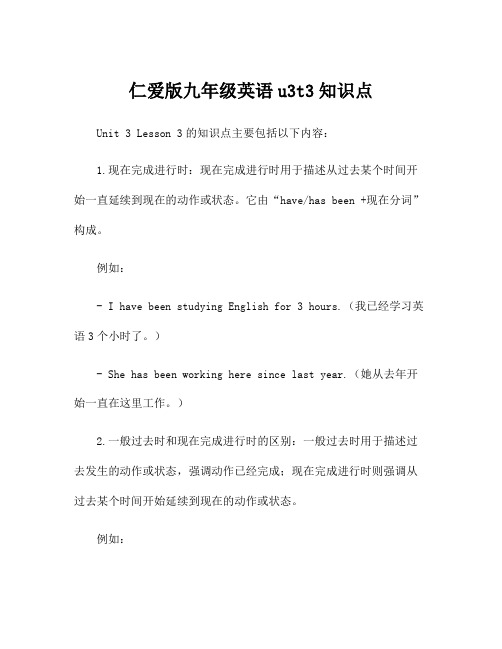
仁爱版九年级英语u3t3知识点Unit 3 Lesson 3的知识点主要包括以下内容:1.现在完成进行时:现在完成进行时用于描述从过去某个时间开始一直延续到现在的动作或状态。
它由“have/has been +现在分词”构成。
例如:- I have been studying English for 3 hours.(我已经学习英语3个小时了。
)- She has been working here since last year.(她从去年开始一直在这里工作。
)2.一般过去时和现在完成进行时的区别:一般过去时用于描述过去发生的动作或状态,强调动作已经完成;现在完成进行时则强调从过去某个时间开始延续到现在的动作或状态。
例如:- I visited my grandparents yesterday.(我昨天去看望了我的祖父母。
)- I have been studying for the exam.(我一直在为考试而学习。
)3.现在完美时:现在完成时用于描述过去发生的动作或状态对现在造成的影响或结果。
它由“have/has +过去分词”构成。
例如:- I have finished my homework.(我已经完成了我的作业。
)- She has visited many countries.(她已经参观了许多国家。
)4.副词just, yet, already的用法:这些副词用于修饰现在完成时的动词,表示动作发生的时间或顺序。
- just:刚刚、刚才。
例如:I have just arrived.(我刚到。
)- yet:已经、还。
例如:Have you finished your homework yet?(你作业做完了吗?)- already:已经。
例如:He has already left.(他已经离开了。
)5.表示持续性动作的词汇:在描述持续性动作时,可以使用一些动词和词组,如live(住)、work(工作)、study(学习)、be busy(忙碌)、spend time(花时间)等。
九年级英语上册unit3重点词组归纳仁爱版
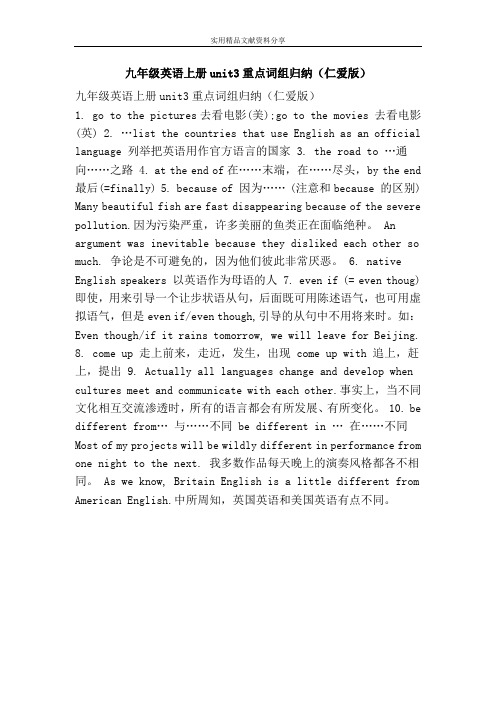
实用精品文献资料分享九年级英语上册unit3重点词组归纳(仁爱版)九年级英语上册unit3重点词组归纳(仁爱版)1. go to the pictures去看电影(美);go to the movies 去看电影(英)2. …list the countries that use English as an official language 列举把英语用作官方语言的国家3. the road to …通向……之路4. at the end of在……末端,在……尽头,by the end 最后(=finally)5. because of 因为…… (注意和because 的区别) Many beautiful fish are fast disappearing because of the severe pollution.因为污染严重,许多美丽的鱼类正在面临绝种。
An argument was inevitable because they disliked each other so much. 争论是不可避免的,因为他们彼此非常厌恶。
6. native English speakers 以英语作为母语的人7. even if (= even thoug)即使,用来引导一个让步状语从句,后面既可用陈述语气,也可用虚拟语气,但是even if/even though,引导的从句中不用将来时。
如:Even though/if it rains tomorrow, we will leave for Beijing.8. come up 走上前来,走近,发生,出现 come up with 追上,赶上,提出 9. Actually all languages change and develop when cultures meet and communicate with each other.事实上,当不同文化相互交流渗透时,所有的语言都会有所发展、有所变化。
- 1、下载文档前请自行甄别文档内容的完整性,平台不提供额外的编辑、内容补充、找答案等附加服务。
- 2、"仅部分预览"的文档,不可在线预览部分如存在完整性等问题,可反馈申请退款(可完整预览的文档不适用该条件!)。
- 3、如文档侵犯您的权益,请联系客服反馈,我们会尽快为您处理(人工客服工作时间:9:00-18:30)。
仁爱版九年级英语Unit 3 Topic 1
1. 满意,高兴be pleased with 3. 成百万的millions of 4. 迫不及待做某事can’t wait to do sth.
5. 从现在开始from now on
6. 为……做准备be ready for
7. 被广泛地使用be widely used 9. 出差on business 10. 与……相似be similar to
12. 向……寻求帮助ask…for help
13. 通常来说generally speaking/ in general 14. 做……有麻烦have trouble doing
15. 有时once in a while 16. 随身携带take along with
17. 扮演重要的角色play an important part/role in…
20. 在……取得进步make progress in doing sth. 22. 把……当做……regard…as…
23. 被……当做be regarded…as…
24. 把……译为……translate…into…25. 把……分成… divide…into…
26. …的数量the number of 大量的a number of
27. 总之……in short / in a word 28. 坚持(做)某事stick to (doing)sth.
29. 既…又…/ 除…之外…as well as
Unit 3 Topic 2
1.代替instead of 2、处于领先地位take the leading position
3. 讲英语的国家English-speaking country 5. 成功地做某事succeed in doing sth. 6. 表达自己的意思make oneself understood
7. 为某人送行see sb off 8. 不完全not exactly
9. 大体上讲,总的来说generally speaking 10. 搭车ask for a ride
12. 冷静下来calm down
13. 与…不同be different form 14. 离……很近be close to
15. 至于as for 16. 爱好做某事be fond of doing sth.
17. 更糟糕的是Even worse 18. 发生come about /take place
19. 被迫做某事be forced to do sth. 20. 接纳,领会take in
22. 一点点little by little
23. 面对面face to face 24. 在某人……的路上on one’s way to
25. 伸出,扑灭put out 26. 进入get in
27. 搭载,捡起,让……乘车pick up 28. 填充fill in 填满fill out
30. 发生come about
31. 听从某人建议follow sb’s advice 32. 顺便说by the way
33. 依靠某人depend on sb. 35. 做……有困难have difficulty doing sth. 37. 检验,检测check on
39. 翘起人的大拇指raise sb’s thumb 40. 伸出某人的大拇指put out sb’s thumb Unit 3 Topic 3
1. 在……薄弱be weak in 擅长be good at / do well in
2. 阅读能力reading ability
3. 给某人一些有关……的建议give sb. some advice on……
4. 犯错误make mistakes 错误地by mistake
5. (深)呼吸take a (deep) breath 上气不接下气out of breath
6. 试一试have a try 8. 意识到come to realize
9. 最后但同样重要的last but not least 10. 放弃give up 11. 为了in order to
12. 日记keep a diary 13. 做笔记take notes 14. 有时at times
15. 想要做某事feel like doing sth. 16. 只要as long as
17. 继续做某事keep on doing sth
19. 信任某人believe in sb. 相信某人believe sb.
20. 各胜古迹place of interest
21. 和某人分享share sth. with sb.。
